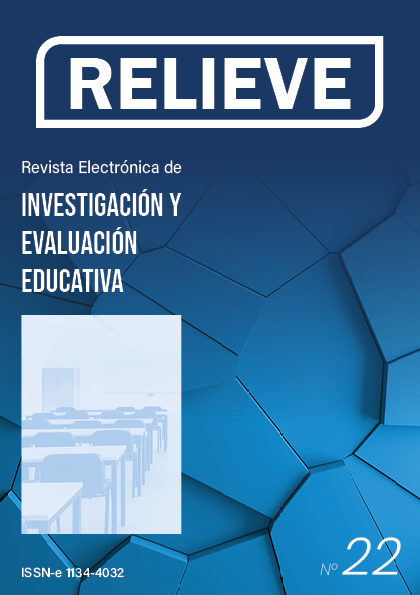Relational gender preferences in the school context: a new measure for the diagnosis of gender relations in education
DOI:
https://doi.org/10.7203/relieve.22.1.6877Keywords:
Coeducation, Adolescence, Peer Relations, Gender Differences, Sociometric Analysis, Educational Assessment, Reliability & Validity, Social Distance, Scales, Multiple Correspondence Analysis (MCA).Abstract
This study evaluates a new methodological procedure for "micro-sociometric" analysis of gender relationship patterns in the adolescent students, which is analyzed using Multiple Correspondence Analysis (MCA). The purpose of the study is to develop and assessment of the Gender Relationship Preferences Scale (GRPS), in order to obtain valid and reliable data to recognize the willingness of the young (girls and boys) to interact with their peers; and to determine whether the relationships established between them are conditioned by the gender differential socialization proposed by patriarchy (Bosch, Ferrer & Alzamora, 2006; Lagarde, 1996; Lomas, 2007; Lorente, 2007; Rodríguez-Mosquera, 2011; Simón, 2010; Tomé & Tonucci, 2013). The sample size is 6000 cases, adolescent students, of whom 50.8% are women and 49.2% are men, with a mean age of 13.82 years. The construct validity is tested and it has obtained a high reliability (Cronbach's alpha = .92) for the determining the allocation of roles and gender stereotypes in the classroom, what it is obtained while considering the "social distance" and elective structure of boys and girls in classrooms. Maps "micro-sociometric", obtained with MCA, facilitates the interpretation of the results, which are consistent with other theoretical approaches, identifying the "social distance" between people, categories and both genders. The results highlight relational activities showing very marked gender patterns such as sharing clothing or choosing a couple, and the relational behaviors associated with inter-intra gender differentiation.Downloads
Downloads
Additional Files
Published
How to Cite
Issue
Section
License
The authors grant non-exclusive rights of exploitation of works published to RELIEVE and consent to be distributed under the Creative Commons Attribution-Noncommercial Use 4.0 International License (CC-BY-NC 4.0), which allows third parties to use the published material whenever the authorship of the work and the source of publication is mentioned, and it is used for non-commercial purposes.
The authors can reach other additional and independent contractual agreements, for the non-exclusive distribution of the version of the work published in this journal (for example, by including it in an institutional repository or publishing it in a book), as long as it is clearly stated that the Original source of publication is this magazine.
Authors are encouraged to disseminate their work after it has been published, through the internet (for example, in institutional archives online or on its website) which can generate interesting exchanges and increase work appointments.
The fact of sending your paper to RELIEVE implies that you accept these conditions.














